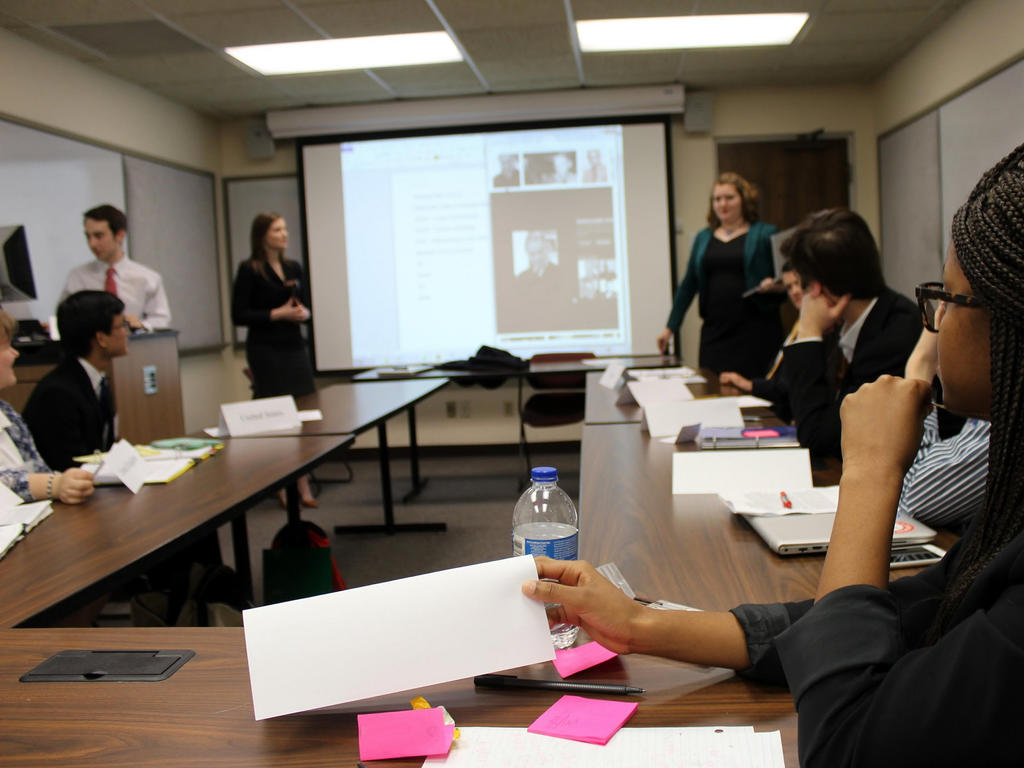For nearly 40 years, Rhodes College has hosted the Mid-South Model United Nations (MSMUN) Conference, which will be held this year Feb. 16-18 on campus. Twenty high schools from Tennessee, Arkansas, Louisiana, and Alabama will send about 300 delegates to debate and solve world issues in a simulation of the UN General Assembly and the United Nations Security Council.
Members of the Rhodes chapter of Model United Nations, as well as students in Model UN clubs from George Washington University, the University of Mississippi, Lipscomb University, and the University of Tennessee at Knoxville make up the MSMUN staff. Emily Perry, who serves as Secretary General of Rhodes Model UN, and Meredith Kendrick, who is the Undersecretary General, helped plan the 2018 conference. “We work behind the scenes and directly with the advisors and students,” says Perry. “The college students, who are chairs and co-chairs of each committee, have written background guides for the delegates, and moderate debate during the conference.”
Participation in Model UN allows students to gain problem solving, consensus building, and leadership skills. Delegates research and write resolutions on different topics, having to work with the other 60-70 delegates in the room to reach a solution that is good for the global whole. “I was involved in Model UN all through high school and really credit it with my ability to speak in public and my ability to not be prepared for things but still do well,” says Perry, who is a Russian Studies major. “Several staff members at MSMUN are alums of the program and are now students at Rhodes; it really does retain students.”
The Rhodes Department of International Studies also plays a role in the conference, encouraging positive debate and participation among delegates as well as reminding delegates of the educational purpose of the simulation and that awards presented at the end of the conference are not a delegation’s main emphasis. They also serve to encourage professionalism in speech, actions, and appearance, as each faculty member attends committee session and deliver small lectures on their topic of study. Current department head, Dr. Amy Risley, will deliver remarks at the opening ceremonies.
This year, the debate topics vary from territorial disputes in the South China Sea and the political crisis in Venezuela to offshore military bases and the use of agricultural antibiotics. “The social humanitarian and cultural committee, for example, is debating the issue of women in prisons and the abuse they may or may not undergo as well as healthcare equality for the LGBT community,” adds Perry. “The economic and financial committee is debating e-waste, where deleted files go, and at what point do you bring the satellites down.”
Dr. Nikolaos Zahariadis, a native of Greece and professor of international studies, serves as advisor of the Rhodes chapter of Model UN and says, “The process involves learning about friends and foes and of course, perhaps equally importantly, learning how and when to compromise. I think it is a great recruitment tool for Rhodes College. Because of the contact with Rhodes faculty, counselors and advisors may be more inclined to suggest the college as a possibility.”
Rhodes also offers its students the opportunity to enroll in International Studies 133, the class corresponding to the Model UN where debate and procedure are emphasized. Students engage in topical research on political, economic, and social issues.
“I just think Mid-South Model UN is a really good opportunity not only for the high school students but also for the Rhodes students,” says Perry. “We are able to market our department and learn something from the students involved.”
For more information about the 37th annual Mid-South Model United Nations visit: https://msmun.net/
By Meg Jerit ’20
